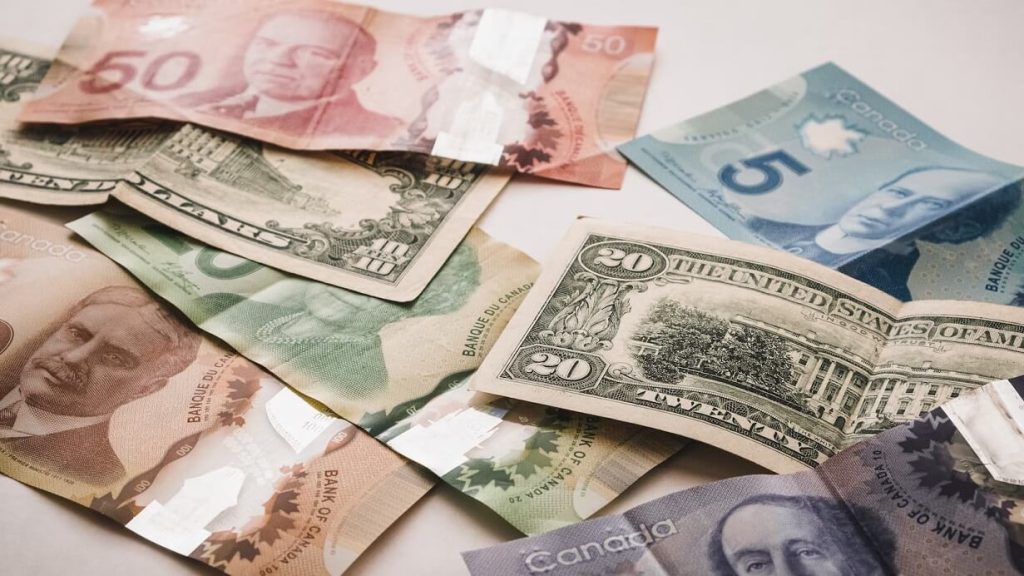A drop in the exchange rate between Canada and the United States has added to the inflation challenges Canadians are currently facing. When the U.S. dollar (USD) value rises against that of the Canadian dollar (CAD), then imports from the U.S., Canada’s largest trading partner, become more expensive for Canadian consumers.
In response to rising inflation, the Central Bank of Canada may keep interest rates higher for longer than initially anticipated. Higher interest rates affect businesses in every sector, and many families in every province may feel the pinch.
Today, we are going to take a closer look at the relationship between exchange rates and inflation, how it can affect currency markets, and why this matters for consumers and investors alike.
What is Inflation?
As an essential economic indicator, inflation is scrutinized heavily in economies around the world. It influences the decisions of central banks and impacts the behavior of financial markets. Rapid inflation in one country can significantly affect the value of goods with its trading partner and cause ripple effects in other economies.
Inflation also affects interest rates; when inflation is high, a country’s central bank may keep its interest rate high to discourage consumers from spending. This reduces the money supply in circulation, making each dollar worth more because the supply is limited. Over time, the reduced, yet more valuable, money supply leads to low inflation.
When consumers spend less money, businesses typically respond by lowering prices which, in turn, can lower inflation. As inflation lowers or stalls, central banks lower the interest rate to encourage people to invest and purchase more.
How Inflation Affects Exchange Rates

Interest rates and inflation affect currency markets and their respective exchange rate, too. In a country with higher interest rates, the country’s currency value likewise increases, so investors get a better return on their investment when they opt to invest in other countries whose central banks offer a high-interest rate, a practice known colloquially as “hot money flows.”
The inflation cycle works something like this:
- The Bank of Canada will raise interest rates in response to inflation
- Savings accounts offer higher investment returns
- The "hot money" flows as investors opt for a higher interest rate
- The demand for CAD increases
- The value of the CAD increases
Investors tend to prefer more stable economies to reduce risk while increasing profit. Investors may also consider whether the exchange and interest rates are in response to economic growth or an effort to tame inflation rates. If they note the latter situation, they may invest elsewhere.
How Inflation Rates Affect Exchange Rates
High inflation typically depresses the value of a country’s currency. Increased inflation increases a country’s purchasing power, weakening it against other, more stable currencies. So, as inflation increases, the currency conversion, or exchange rate, decreases.
Furthermore, as inflation increases, exchange rates become more volatile. Cross-border money transfers, like those between Canada and the U.S., can be more costly. Conversions from CAD to USD may be worth less, increasing the cost of goods. This can also slow economic growth, as consumers are spending less.
The direct result of inflation on the currency exchange rates between the CAD and USD may be felt on a couple of levels:
- Interest rates: Inflation negatively impacts the interest rates, depreciating the currency.
- Purchasing power parity: This compares the general purchasing power of different countries using the general price level of consumer goods instead of the exchange rate. A country's purchasing power changes affect its exchange rate (and inflation).
Final Thoughts on the Relationship Between Inflation and Exchange Rates
Generally, when the two countries’ average inflation rate is the same, the exchange rate will not change. But, when inflation is higher in one country than another, the country with the higher inflation rate will see its value depreciate. If the inflation rate in the U.S. continues to rise, then the value of the USD will decrease. However, because of the interconnected trade between Canada and the U.S., inflation in the United States will also affect interest rates and prices for Canadian consumers.
Do You Need Professional Advice on Currency Trading?
Whether you’re a novice investor or a seasoned one, the team at CanAm Currency Exchange can help you grow your investments, diversify your portfolio, and reach your investment goals. We provide premium financial services, including bullion products and foreign currency trading for individual investors or businesses. We take a cost-leadership approach to personal currency exchange (Windsor) and maximum transparency.
For superior customer service and sage advice, give CanAm Currency Exchange a call today!





